Frederick County Green Homes Challenge
Learn about other climate showcase communities.
Frederick County, Maryland
Federal Funding: $500,000
Project Timeline: March 2011 – February 2015
- Project Summary
- Community Characteristics
- Results
- Lessons Learned
- Sustainability/ Replication
- Project Websites
- Photos
Frederick County implemented its Green Homes Challenge (GHC) to help residents save energy, reduce electricity bills, and learn life-long environmentally-friendly practices. The County organized the GHC and certified households at three levels. The first level of certification was the Power Saver certification level, which focused on community education and engagement, home energy audits, and energy-saving actions and retrofits. Powerware Parties were the primary outreach method. At these small social gatherings, program coordinators or volunteers distributed energy-efficiency products, demonstrated technologies, taught people about the Green Homes Certification program, and asked community members to pledge to reduce energy-use or register with the Challenge. Regardless of whether participants signed up for the Challenge, they had access to volunteer-conducted home energy audits and audit tools, the Earth Aid energy-use and reduction tracking tool, the proposed Frederick County Clean Energy Loan Program (CELP), and personalized follow-up and assistance.
“Green Ambassador” volunteers promoted the initiative throughout the duration of the project and supported GHC initiatives to fellow community members. The County offered support and one-on-one coaching to all Challenge Takers to complete the challenges and become Certified Power Savers. Frederick County residents were also able to earn a Green Living Leader certification. Under this program, residents earned a certain number of points for sustainable transportation choices, waste management habits, food choices, cleaning materials, outdoor and yard activities, and home office behaviors. Finally, residents could achieve the Sustainable Star certification level. To reach this level, residents must install renewable energy systems and could take advantage of local, state, and federal incentives as well as mini grants available through the GHC.
Additionally, Frederick County published the Green Leader Handbook and handouts on several topics. Chapters and actions for the Renewable Star Handbook were completed and are currently under management review. The County secured a grant from the Maryland Department of Housing and Community Development, which funded an online version of the GHC, known as the Frederick Green Challenge Exit. The website supported all three Challenges (Power Saver, Green Leader, and Renewable Star) and was designed to sustain the GHC beyond the EPA Climate Showcase Communities funding. Since the launch of the website, the Frederick County Office of Sustainability and Environmental Resources has been contacted by two entities about replicating the site for other communities.
The Frederick County GHC reduced greenhouse gas (GHG) emissions, energy-use, and energy costs for households in Frederick County through home retrofit projects and installation of energy-efficient devices and renewable energy systems. The Challenge was supported by partnerships with Allegheny Power, the Reaching Independence and Stability through Employment (RISE) workforce development program, the cities of Frederick, Middletown, and Brunswick, and local businesses. By February 2015, the program had reached 5,065 residents and held over 160 events. The Challenge had 1,628 participants and 744 self-Certifications were achieved across all of the Challenges. During the Renewable Star Challenge, 66 solar electric systems and 12 solar thermal systems were installed on 69 homes.
Population: 224,185
Area: 662.88 square miles
Government Type: County
Community Type: Suburban
Median household income: $80,970
|
Final Results |
Projected Cumulative Results |
|
|---|---|---|
|
Annual GHG Reductions |
4,924.9 mt CO2e |
2,268 mtCO2e |
|
Annual Electricity Savings |
6,409 MWh |
- |
|
Gasoline Savings |
99,440 gallons |
- |
|
Annual Economic Savings |
$854,871 |
- |
|
Renewable Energy Generated (MMBTUs/hr) |
685,757 |
- |
|
Annual Water Savings (Gallons/yr) |
27,643,722 |
- |
- Motivating people to continue to participate in the GHC and return to the online interactive system or handbooks after their initial enthusiasm was a significant challenge. There is a segment of the population that is motivated to do this on their own, but many people required follow-up and personal navigation.
- If specific outputs and outcomes are needed by program implementers, the County would recommend building in one-on-one navigation or coaches into program design and budgets.
- The GHC could have benefitted from having a well-known, local leader, or local celebrity serving as a “Community Champion” to promote it from the very start. The promotional efforts were somewhat limited by available staff and volunteers.
- Branding was a key to the program’s success. Having the GHC as a brand allowed everything to be and look coordinated as opposed to a smattering of short term programs that may or may not related to each other. It also provides a framework though which people may become motivated to take additional actions.
- The GHC has been a positive complement to other community initiatives addressing carbon emissions, such as the annual Western Maryland Solar and Green Homes Tour. Many Certified Challenge Takers and participants in the Solarize Frederick County initiative open their homes for the Tour and use the tour to educate and help other households reduce their GHG emissions.
- Frederick County has made the FrederickGreenChallenge.org software platform available at no charge to any organization or jurisdiction that would like to customize it for their use. There is a nominal charge by the software developer to strip out Frederick County data and prepare the software for replication. This information has been shared directly with approximately three municipalities who called and expressed interest.
Frederick Green Challenge Website Exit
Frederick County Green Homes Challenge website
Frederick County Green Homes Challenge Twitter page Exit
Frederick County Green Homes Challenge Facebook page Exit
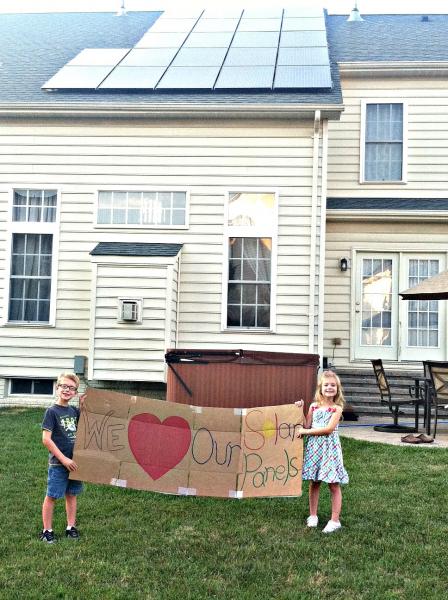 Solar PVs installed on a home through the Renewable Star Challenge
Solar PVs installed on a home through the Renewable Star Challenge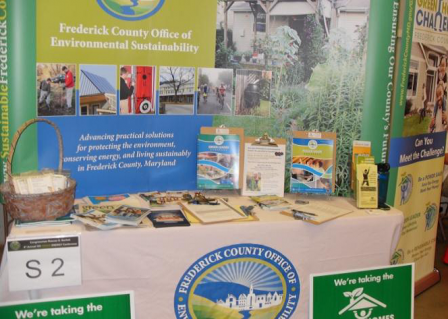 GHC staff and interns hosted an outreach booth at the Go Green Energy Conference on 7/9/2012.
GHC staff and interns hosted an outreach booth at the Go Green Energy Conference on 7/9/2012.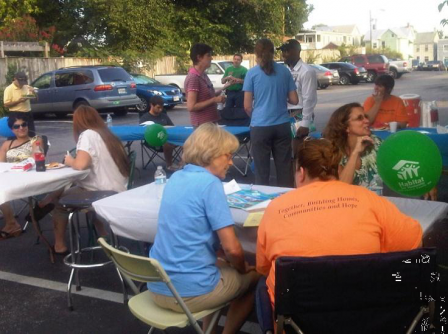 Frederick County Government Powerware Party on 7/17/12, with 8 attendees.
Frederick County Government Powerware Party on 7/17/12, with 8 attendees.GHC staff hosted an outreach booth during a Habitat for Humanity BBQ on 7/26/12.
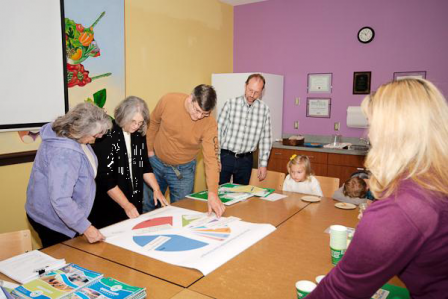 Common Market Powerware Party on 9/29/12, with 9 attendees.
Common Market Powerware Party on 9/29/12, with 9 attendees.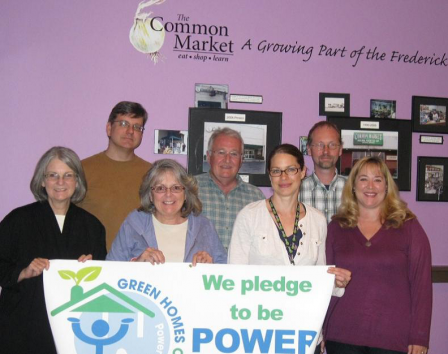 Common Market Powerware Party on 9/29/12, with 9 attendees.
Common Market Powerware Party on 9/29/12, with 9 attendees.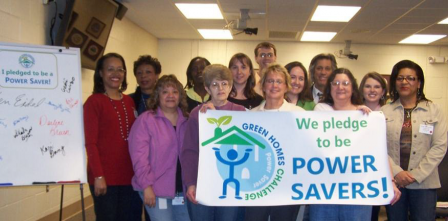 Frederick County Government Powerware Party on 4/13/11, with 13 attendees
Frederick County Government Powerware Party on 4/13/11, with 13 attendees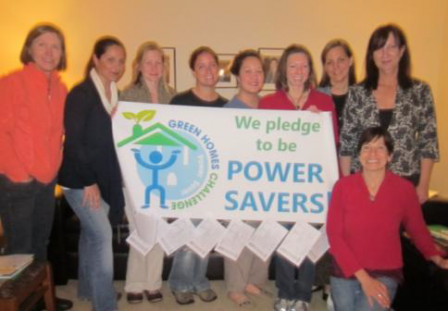 Yarmus Family Powerware Party in Middleton, MD on 5/4/11, with 10 attendees.
Yarmus Family Powerware Party in Middleton, MD on 5/4/11, with 10 attendees.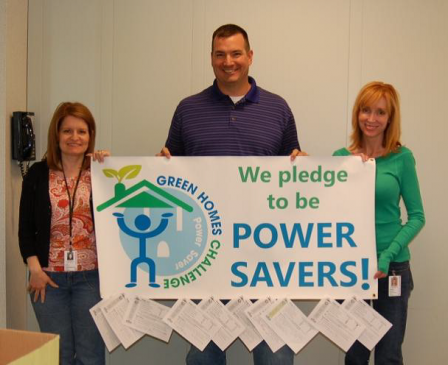 State Farm Insurance Powerware Party on 5/6/11, with 10 attendees.
State Farm Insurance Powerware Party on 5/6/11, with 10 attendees.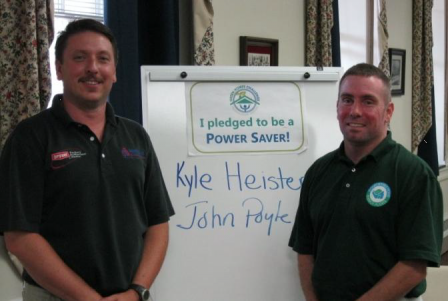 Frederick County Government Powerware Party on 6/23/11, with two home performance professionals as participants, one of which signed up to become a Green Ambassador.
Frederick County Government Powerware Party on 6/23/11, with two home performance professionals as participants, one of which signed up to become a Green Ambassador.